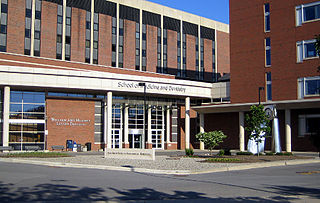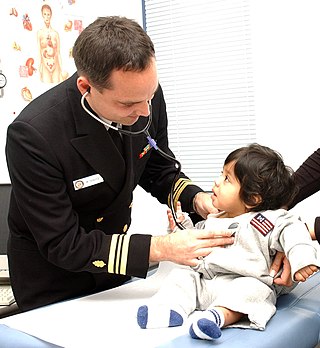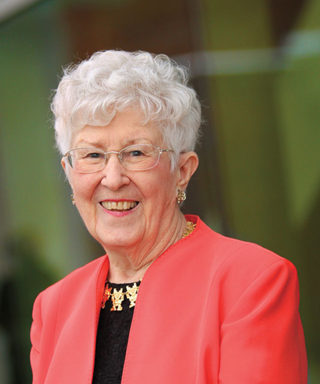
An emergency department (ED), also known as an accident and emergency department (A&E), emergency room (ER), emergency ward (EW) or casualty department, is a medical treatment facility specializing in emergency medicine, the acute care of patients who present without prior appointment; either by their own means or by that of an ambulance. The emergency department is usually found in a hospital or other primary care center.

A prescription, often abbreviated ℞ or Rx, is a formal communication from a physician or other registered healthcare professional to a pharmacist, authorizing them to dispense a specific prescription drug for a specific patient. Historically, it was a physician's instruction to an apothecary listing the materials to be compounded into a treatment—the symbol ℞ comes from the first word of a medieval prescription, Latin recipere, that gave the list of the materials to be compounded.

Primary care is the day-to-day healthcare given by a health care provider. Typically this provider acts as the first contact and principal point of continuing care for patients within a healthcare system, and coordinates other specialist care that the patient may need. Patients commonly receive primary care from professionals such as a primary care physician, a physician assistant, a physical therapist, or a nurse practitioner. In some localities, such a professional may be a registered nurse, a pharmacist, a clinical officer, or an Ayurvedic or other traditional medicine professional. Depending on the nature of the health condition, patients may then be referred for secondary or tertiary care.

The University of Rochester Medical Center (URMC), now known as UR Medicine, is located in Rochester, New York, is one of the main campuses of the University of Rochester and comprises the university's primary medical education, research and patient care facilities.

A nurse practitioner (NP) is an advanced practice registered nurse (APRN) and a type of mid-level practitioner. NPs are trained to assess patient needs, order and interpret diagnostic and laboratory tests, diagnose disease, formulate and prescribe medications and treatment plans. NP training covers basic disease prevention, coordination of care, and health promotion. One study found that although reasons for referrals to specialists are similar for both physicians and NPs, the quality of documentation in the referrals may be lower for NPs.

The University of Vermont Medical Center (UVMMC) is a five-campus academic medical facility under the corporate umbrella of the University of Vermont Health Network that is anchored by a 562-bed hospital in Burlington, Vermont. UVMMC is based in Burlington and serves as both a regional referral center and a community hospital. The hospital was formerly known as the Medical Center Hospital of Vermont and later as Fletcher Allen Health Care until getting its current name. It is affiliated with the University of Vermont's Robert Larner College of Medicine and its College of Nursing and Health Sciences.

Health care in Saudi Arabia is a national health care system in which the government provides free universal healthcare coverage through a number of government agencies. There is also a growing role and increased participation from the private sector in the provision of health care services. Saudi Arabia has been ranked among the 26 best countries in providing high quality healthcare.

NHS Scotland, sometimes styled NHSScotland, is the publicly funded healthcare system in Scotland and one of the four systems that make up the National Health Service in the United Kingdom. It operates 14 territorial NHS boards across Scotland, supported by seven special non-geographic health boards, and Public Health Scotland.
A health professional, healthcare professional, or healthcare worker is a provider of health care treatment and advice based on formal training and experience. The field includes those who work as a nurse, physician, physician assistant, registered dietitian, veterinarian, veterinary technician, optometrist, pharmacist, pharmacy technician, medical assistant, physical therapist, occupational therapist, dentist, midwife, psychologist, audiologist, healthcare scientist, or who perform services in allied health professions. Experts in public health and community health are also health professionals.

Emergency nursing is a specialty within the field of professional nursing focusing on the care of patients who require prompt medical attention to avoid long-term disability or death. In addition to addressing "true emergencies," emergency nurses increasingly care for people who are unwilling or unable to get primary medical care elsewhere and come to emergency departments for help. In fact, only a small percentage of emergency department (ED) patients have emergency conditions such as a stroke, heart attack or major trauma. Emergency nurses also tend to patients with acute alcohol and/or drug intoxication, psychiatric and behavioral problems and those who have been raped.

The National Healthcare Group (NHG) is a group of healthcare institutions in Singapore. The group was formed in 2000 and operates several hospitals, national specialty centers, and polyclinics. Tan Tock Seng Hospital is the largest hospital in the group and serves as the flagship hospital for the cluster.

Clinical pharmacy is the branch of pharmacy in which clinical pharmacists provide direct patient care that optimizes the use of medication and promotes health, wellness, and disease prevention. Clinical pharmacists care for patients in all health care settings but the clinical pharmacy movement initially began inside hospitals and clinics. Clinical pharmacists often work in collaboration with physicians, physician assistants, nurse practitioners, and other healthcare professionals. Clinical pharmacists can enter into a formal collaborative practice agreement with another healthcare provider, generally one or more physicians, that allows pharmacists to prescribe medications and order laboratory tests.

Southwestern Vermont Medical Center (SVMC) is a non-profit general medical surgical hospital located in Bennington, Vermont. It is licensed for 99-beds. Founded in the early 20th century by donations from Henry W. Putnam and his son, SVMC is the only hospital in Bennington County, Vermont. It also serves portions of western Windham County, Vermont, eastern Rensselaer County, New York, and eastern Washington County, New York.

Nursing is a profession within the healthcare sector focused on the care of individuals, families, and communities so they may attain, maintain, or recover optimal health and quality of life. Nurses can be differentiated from other healthcare providers by their approach to patient care, training, and scope of practice. Nurses practice in many specialties with differing levels of prescription authority. Nurses comprise the largest component of most healthcare environments; but there is evidence of international shortages of qualified nurses. Nurses collaborate with other healthcare providers such as physicians, nurse practitioners, physical therapists, and psychologists. There is a distinction between nurses and nurse practitioners; in the U.S., the latter are nurses with a graduate degree in advanced practice nursing, and are permitted to prescribe medications unlike the former. They practice independently in a variety of settings in more than half of the United States. Since the postwar period, nurse education has undergone a process of diversification towards advanced and specialized credentials, and many of the traditional regulations and provider roles are changing.
DMC Sinai-Grace Hospital is the largest of the eight hospitals that comprise the Detroit Medical Center. Located in northwest Detroit, Sinai-Grace provides health care services in over 40 specialties and has 334 inpatient beds, is a full-service hospital including comprehensive cardiac care, stroke, surgical intensive care, medical intensive care, trauma and emergency medicine, cancer treatment, general and robotic surgeries, women's health, urology, gastrointestinal, gerontology, obstetrics/gynecology and cosmetic/plastic surgery.
In South Africa, private and public health systems exist in parallel. The public system serves the vast majority of the population. Authority and service delivery are divided between the national Department of Health, provincial health departments, and municipal health departments.

Healthcare in Belgium is composed of three parts. Firstly there is a primarily publicly funded healthcare and social security service run by the federal government, which organises and regulates healthcare; independent private/public practitioners, university/semi-private hospitals and care institutions. There are a few private hospitals. Secondly is the insurance coverage provided for patients. Finally, industry coverage; which covers the production and distribution of healthcare products for research and development. The primary aspect of this research is done in universities and hospitals.

Medical Colleges of Northern Philippines (MCNP) is a private, nonsectarian, tertiary-level, learning institution in Cagayan Valley, Philippines that offers courses for health professions. It was established in 1994 by Doctor Ronald P. Guzman, referred to as "Father Eagle" by the school's stakeholders.

Loretta C. Ford is an American nurse and the co-founder of the first nurse practitioner program. Along with pediatrician Henry Silver, Ford started the pediatric nurse practitioner program at the University of Colorado in 1965. In 1972, Ford joined the University of Rochester as founding dean of the nursing school.
A retail clinic is a category of walk-in clinic located in retail stores, supermarkets and pharmacies that treat uncomplicated minor illnesses and provide preventative health care services. They are sometimes called "retail-based clinics," "convenient care clinics," or "nurse-in-a-box." Retail clinics in the United States are usually staffed by physician assistants (PAs) or nurse practitioners (NPs) and do not necessarily have a physician physically available onsite. Some, however, are staffed by physicians.
















